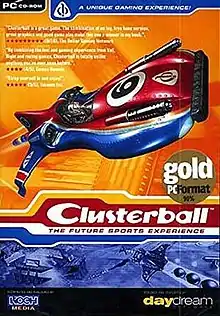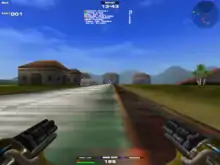Clusterball
Clusterball is a 2000 video game featuring futuristic sport gameplay created by the Swedish Company Daydream Software and published by Strategy First, RealNetworks and Daydream Software itself.
| Clusterball | |
|---|---|
 British box art | |
| Developer(s) | Daydream Software |
| Publisher(s) | Daydream Software Strategy First (retail reissue) |
| Platform(s) | Macintosh, Windows |
| Release | July 17, 2000 2001 (retail reissue) |
| Genre(s) | Racing |
| Mode(s) | Multiplayer |
Clusterball began development in early 1997 as a research and development experiment at Daydream. It was the company's first fully 3D game, as its other projects were pre-rendered.
Gameplay

Clusterball is an action-sports game that plays out in a three-dimensional graphical environment. The player controls a sci-fi aircraft and maneuvers environments based on the Arctic, the Taj Mahal, Stonehenge and other locations.
In Clusterball, the player must collect as many balls as they can from the playing field then fly them through a ring in the center of the stage to collect points. Various weapons and power ups are strewn around the stages, enabling players to steal their opponents' balls or invert the controls of the other player, making movement much more difficult. The balls lie on magnetic ramps and the aircraft must slide on these ramps to collect the balls. As the player tows more and more balls, which create a tail behind the aircraft, the aircraft becomes gradually heavier, therefore more vulnerable to enemy attacks.[1]
The game was designed to enable online multiplayer gameplay.
Development
Origins
Clusterball began as a research and development experiment at Daydream Software.[2] Initially, it was spearheaded by company co-founder Jörgen Isaksson.[3] The project derived from Daydream's worry, according to the team's Nigel Papworth, that the production pipeline used by its titles Safecracker and Traitors Gate was "too costly and time consuming to be a viable long term solution" for the company.[2] Development began in early 1997.[4] In designing Clusterball, the team sought to create a unique online multiplayer game without violence, as Daydream did not release violent titles.[4] The company told investors in June 1997 that "feasibility study and research" was underway for a game codenamed Project 3,[5] later revealed as Clusterball.[6] A prototype had been created by that time to test the game's technology.[5]
They settled on a combination of sports and flight simulator gameplay,[1][4] with elements of racing and inspiration from the game Diamond Mine. The design was also driven by a desire among certain Daydream employees for "a game where you could fly around in a landscape and see very far" into the distance, according to the team's Matti Larsson.[4] Clusterball was started concurrently with Traitors Gate and was developed side by side with that game.[2] When asked how the team initially came up with the idea for Clusterball in an interview with Eurogamer, Daydream Software's Nigel Papworth responded with "We sat around and discussed what we thought were the greatest aspects of real life games and computer games, and concluded that ball games rule in real life, flight sims in the digital universe. The conclusion was to build a flight sim ball game!"[1]
Reception
Legacy
A sequel to Clusterball called Clusterball Arcade was released for iPhone by Resolution Interactive, a team consisting of ex-Daydream Software members.
References
- Bye, John (August 4, 2000). "Interview; Daydreamers". Eurogamer. Archived from the original on July 16, 2001.
- Unland, Brice (May 8, 1999). "Interview with Nigel Papworth on Traitors Gate". Mac Game Gate. Archived from the original on October 4, 1999. Retrieved July 5, 2019.
- Staff. "Daydream – om ett företag före sin tid" (in Swedish). Umeå. Archived from the original on August 21, 2018.
- Unland, Brice (April 28, 1999). "Interview with Matti Larsson of Daydream". Mac Game Gate. Archived from the original on October 4, 1999.
- Delårsrapport, september 1996 - maj 1997 (Report) (in Swedish). Daydream Software. June 23, 1997. Archived from the original on April 26, 2003. Retrieved July 5, 2019.
- Delårsrapport september 1997 - november 1997 (Report) (in Swedish). Daydream Software. January 15, 1998. Archived from the original on April 26, 2003. Retrieved July 5, 2019.
- Sulic, Ivan (January 8, 2002). "Clusterball". IGN. Archived from the original on June 14, 2004.
- Bramwell, Tom (September 18, 2001). "Review; Clusterball". Eurogamer. Archived from the original on December 22, 2001.
- Osborne, Scott (September 24, 2001). "Clusterball". GameSpot. Archived from the original on January 27, 2005.
- Rice, Kevin (December 11, 2001). "Clusterball (PC) Review". GameSpy. Archived from the original on February 20, 2002. Retrieved October 10, 2019.
- Shoemaker, Richie (November 2001). "Reviews; Clusterball". PC Zone (108): 97.